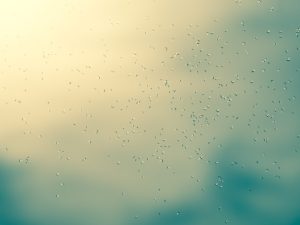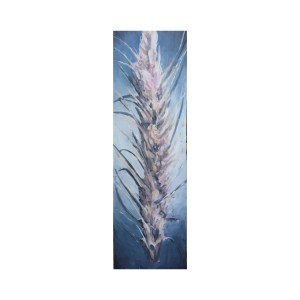I often refer to myself as a poet when engaging in literary circles, but as an artist in Montreal, I’m also a dancer and choreographer. This summer some creative projects which I will be working on are new poems—hopefully working towards a chapbook or micro-chap—which explore themes such as love, violence, femininity, and nature. I will also be curating four dance shows for children, acting as the Dance Specialist at the YMCA-Concordia Fine Arts Camp, a brand-new arts camp hosted at Concordia University’s downtown campus. These shows will primarily be ballet, contemporary, and jazz styles of dance, and will incorporate projections in the Black Box Theatre.
Salena Wiener reading her poetry at Pieces of Process #2.
An event which I recently participated in was the “Pieces of Process” reading series on June 28th at Atwater Library, where I performed my poetry alongside other creatives of different disciplines such as painting, music, and graphic design, and discussed creative process. This was an amazing opportunity where I got to not only share my art, but to connect with other artists who engage in different styles of art. As an artist who engages in different disciplines myself, I think it’s so important to curate spaces where we can come together as creative people, bridging diverse artistic communities typically thought of as separate, so I’m grateful to have been invited to join in this space! This coming fall, I have been invited to read at “An Evening of Verse, Prose & Song” on October 3rd, as part of the Argo Reading Series, which I am looking forward to!
Who or what inspires you?
For my poetry, I find inspiration from books and music. In particular, the Romantics—such as Wordsworth and Mary Shelley—and bands like Being As An Ocean or La Dispute, influence my work. As a choreographer, my main influences are The Nutcracker (which I used to perform in), and “So You Think You Can Dance.” I like my dances to have a narrative and incorporate characters, which I think is where my interest in poetry/literature and dance intersect.
What do most well-written poems have in common?
Poetry is so diverse nowadays that it’s hard to generalize, and my taste is mostly influenced by Romantic poetry, but I personally think that most well-written poems are concise. Every word should have a purpose, and ideas should be expressed as succinctly as possible. I also think that a well-written poem will have some sort of rhythm, and should pay attention to meter at least in so far as the poem still has a musical quality.
What words would you never use in a poem? On the flip side, what words would you find an excuse to incorporate into a poem?
Honestly, there’s no word that I would ban from a poem. I’ve heard rules like ‘don’t use the word “eyes”, but something more descriptive,’ and sometimes I think that’s useful, but also, I just use the words that feel right for the poem. I’m not sure I have a word that I turn to often, but I often return to particular images, like waves or other natural images. I find the relationship between nature, society, and humans really fascinating.
Who is your dream collaborator?
I’m going to go with the ultra-nerdy answer and say that, if I could collaborate with absolutely anyone, I’d go back and write poetry with Mary Shelley.
Salena Wiener lives in Montreal, and is pursuing her undergraduate degree in English Literature Honours at Concordia University. She is a former Prose Editor for Soliloquies Anthology Magazine, and her poetry is featured in Pulp Poets Press, Peculiars Magazine, Cauldron Anthology, Honey & Lime Magazine’s poetry blog Oceans & Time, and elsewhere. She was featured in the “Young Writers” interview series for Prism International. Her academic work appears in the Literature Undergraduates Colloquium at Concordia Proceedings 2019. Follow Salena on Twitter and Instagram for more.


